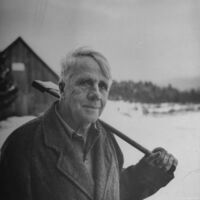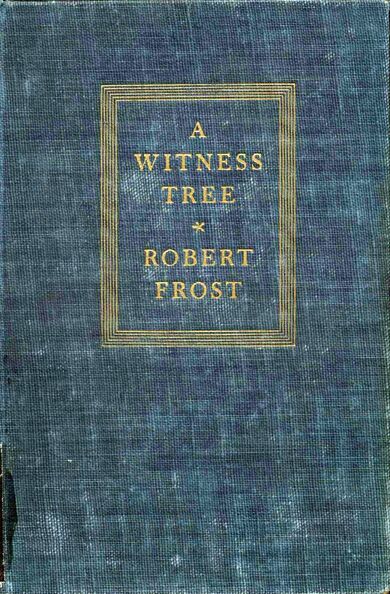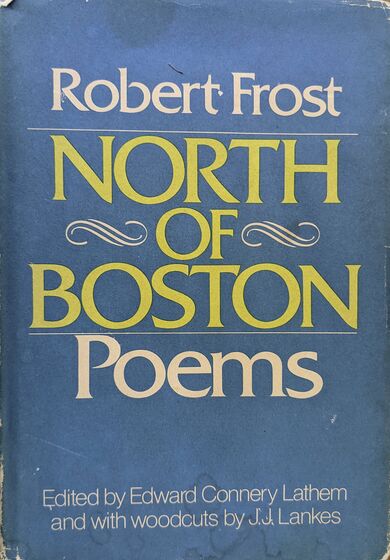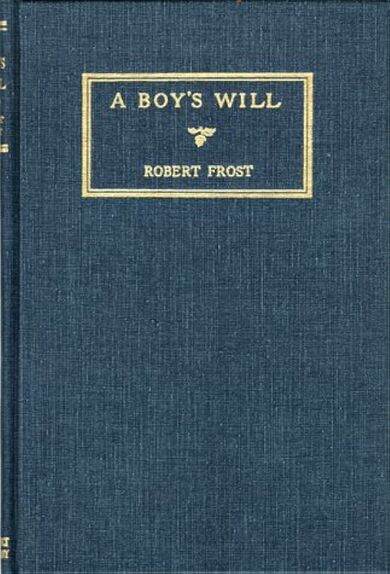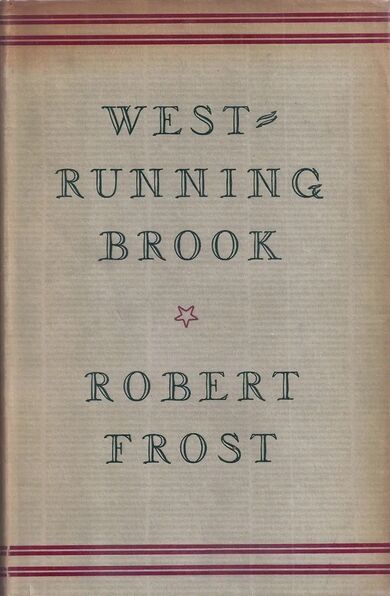Over Back: The Literate Farmer And The Planet Venus
A Dated Popular-Science Medleyon a Mysterious Light Recently Observed in theWestern Sky at Evening
My unexpected knocking at the door
Started chairs thundering on the kitchen floor,
Knives and forks ringing on the supper plates,
Voices conflicting like the candidates.
A mighty farmer flung the house door wide,
He and a lot of children came outside,
And there on an equality we stood.
That’s the time knocking at a door did good.
“I stopped to compliment you on this star
You get the beauty of from where you are.
To see it so, the bright and only one
In sunset light, you’d think it was the sun
That hadn’t sunk the way it should have sunk,
But right in heaven was slowly being shrunk
So small as to be virtually gone,
Yet there to watch the darkness coming on—
Like someone dead permitted to exist
Enough to see if he was greatly missed.
I didn’t see the sun set. Did it set?
Will anybody swear that isn’t it?
And will you give me shelter for the night?
If not, a glass of milk will be all right.”
“Traveler, I’m glad you asked about that light.
Your mind mistrusted there was something wrong,
And naturally you couldn’t go along
Without inquiring if ’twas serious.
’Twas providential you applied to us,
Who were just on the subject when you came.
There is a star that’s Serious by name
And nature too, but this is not the same.
This light’s been going on for several years,
Although at times we think it disappears.
You’ll hear all sorts of things. You’ll meet with them
Will tell you it’s the star of Bethlehem
Above some more religion in a manger.
But put that down to superstition, Stranger.
What’s a star doing big as a baseball?
Between us two it’s not a star at all.
It’s a new patented electric light,
Put up on trial by that Jerseyite
So much is being now expected of,
To give developments the final shove
And turn us into the next specie folks
Are going to be, unless these monkey jokes
Of the last fifty years are all a libel,
And Darwin’s proved mistaken, not the Bible.
I s’pose you have your notions on the vexed
Question of what we’re turning into next.”
“As liberals we’re willing to give place
To any demonstrably better race,
No matter what the color of its skin.
(But what a human race the white has been!)
I heard a fellow in a public lecture
On Pueblo Indians and their architecture
Declare that if such Indians inherited
The cóndemned world the legacy was merited.
So far as he, the speaker, was concerned
He had his ticket bought, his passage earned,
To take the Mayflower back where he belonged
Before the Indian race was further wronged.
But come, enlightened as in talk you seem,
You don’t believe that that first-water gleam
Is not a star?”
“Believe it? Why, I know it.
Its actions any cloudless night will show it.
You’ll see it be allowed up just so high,
Say about halfway up the western sky,
And then get slowly, slowly pulled back down.
You might not notice if you’ve lived in town,
As I suspect you have. A town debars
Much notice of what’s going on in stars.
The idea is no doubt to make one job
Of lighting the whole night with one big blob
Of electricity in bulk the way
The sun sets the example in the day.”
“Here come more stars to character the skies,
And they in the estimation of the wise
Are more divine than any bulb or arc,
Because their purpose is to flash and spark,
But not to take away the precious dark.
We need the interruption of the night
To ease attention off when overtight,
To break our logic in too long a flight,
And ask us if our premises are right.”
“Sick talk, sick talk, sick sentimental talk!
It doesn’t do you any good to walk.
I see what you are: can’t get you excited
With hopes of getting mankind unbenighted.
Some ignorance takes rank as innocence.
Have it for all of me and have it dense.
The slave will never thank his manumitter;
Which often makes the manumitter bitter.”
“In short, you think that star a patent medicine
Put up to cure the world by Mr. Edison.”
“You said it—that’s exactly what it is.
My son in Jersey says a friend of his
Knows the old man and nobody’s so deep
In incandescent lamps and ending sleep.
The old man argues science cheapened speed.
A good cheap anti-dark is now the need.
Give us a good cheap twenty-four-hour day,
No part of which we’d have to waste, I say,
And who knows where we can’t get! Wasting time
In sleep or slowness is the deadly crime.
He gave up sleep himself some time ago,
It puffs the face and brutalizes so.
You take the ugliness all so much dread,
Called getting out of the wrong side of bed.
That is the source perhaps of human hate,
And well may be where wars originate.
Get rid of that and there’d be left no great
Of either murder or war in any land.
You know how cunningly mankind is planned:
We have one loving and one hating hand.
The loving’s made to hold each other like,
While with the hating other hand we strike.
The blow can be no stronger than the clutch,
Or soon we’d bat each other out of touch,
And the fray wouldn’t last a single round.
And still it’s bad enough to badly wound,
And if our getting up to start the day
On the right side of bed would end the fray,
We’d hail the remedy. But it’s been tried
And found, he says, a bed has no right side.
The trouble is, with that receipt for love,
A bed’s got no right side to get out of.
We can’t be trusted to the sleep we take,
And simply must evolve to stay awake.
He thinks that chairs and tables will endure,
But beds—in less than fifty years he’s sure
There will be no such piece of furniture.
He’s surely got it in for cots and beds.
No need for us to rack our common heads
About it, though. We haven’t got the mind.
It best be left to great men of his kind
Who have no other object than our good.
There’s a lot yet that isn’t understood.
Ain’t it a caution to us not to fix
No limits to what rose in rubbing sticks
On fire to scare away the pterodix
When man first lived in caves along the creeks?”
“Marvelous world in nineteen-twenty-six.”

